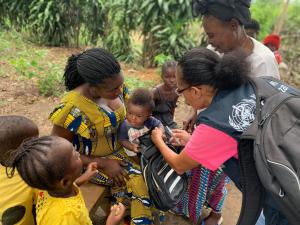An emergency vaccination point for children offers a mother relief against measles in the Democratic Republic of the Congo
As her bus approached the town of Masi Manimba, Rosette Mboma heard a local radio announcement for free measles vaccinations for children the following day.
She immediately decided to interrupt her travel back home to Kikwit city from Kinshasa in the Democratic Republic of the Congo, a 500 km trip she had made with her two children. They quickly left the bus.
Lucky enough, she has a friend living in Masi Manimba who offered her accommodation for the night. Mboma looked for the vaccination centre.
Her son, Christophe, had just turned 6 months, the right age for the measles shot. Daughter Blessings is 2 years old, but she had not yet been vaccinated. Both children are at high risk if not vaccinated, especially because the world’s largest and fastest-moving measles outbreak is being battled currently in every one of the country’s 26 provinces.
“They are not vaccinated because every time I took them to the clinic, I was told the vaccine is not available,” Mboma says while standing in line with dozens of other parents for vaccination at the Lukula Health Centre.
Mboma acted quickly to get her children vaccinated because she is aware of the serious measles epidemic gripping the country. As of 1 October, the number of suspected cases had reached 196 400 (6196 confirmed cases), with 3928 deaths, nearly all of them children.
“I know families whose children got very sick in my village. I have just been lucky, and I am really happy that my children were vaccinated today,” she says.
This vaccination campaign is the third emergency intervention jointly organized this year by the Government with the World Health Organization (WHO) and partners, targeting nearly 825 000 children aged 6–59 months.
The campaign is funded by the United Nations Humanitarian Pooled Fund, with a contribution from the WHO Contingency Fund for Emergencies.
“There are various reasons why children are not getting the measles vaccine,” explains Helen Nyenge, a WHO epidemiologist who is monitoring the campaign in Masi Manimba. “Sometimes, parents fail to the take them to clinics, as recommended by the vaccination calendar. But also, sometimes the vaccines aren’t available.”
For Mboma, who repeatedly had experienced the lack of vaccine where she lives, a bus ride home became a lucky ticket to relief from her measles worries. She joined thousands of parents who this week took their children to health centres around the country for the vaccination campaign.
Communications Officer, WHO Kenya
Mobile: +254 791 197454
Email: kisimirj [at] who.int (kisimirj[at]who[dot]int)
Communications Officer
WHO DRC
Tel : +243 81 715 1697
Office : +47 241 39 027
Email: kabambie [at] who.int (kabambie[at]who[dot]int)
Communications and marketing officer
Tel: + 242 06 520 65 65 (WhatsApp)
Email: boakyeagyemangc [at] who.int (boakyeagyemangc[at]who[dot]int)



